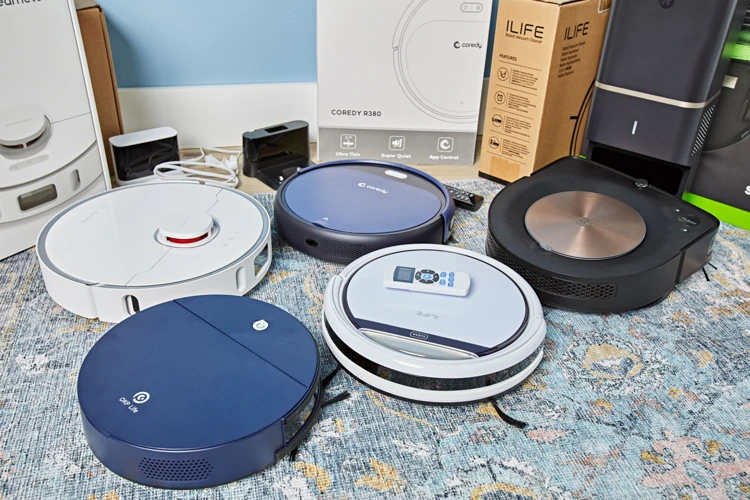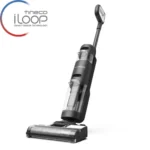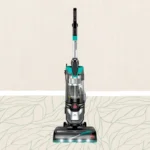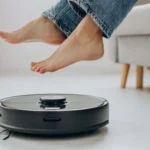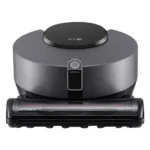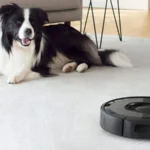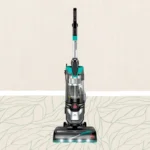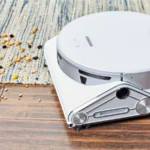Every homeowner wants a clean and healthy home environment, especially when it comes to indoor air quality. One essential tool for maintaining a healthy home is a good vacuum cleaner. However, with the constant evolution of technology, vacuuming has gone smart, and anti-allergen technology has been introduced to the market. The question on everyone’s mind now is: are smart vacuum cleaners with anti-allergen technology worth the extra cost? In this article, we will explore the benefits and drawbacks of investing in one of these hi-tech cleaning machines, helping you make an informed decision for your family’s health and your wallet. Let’s dive in!
The Benefits of Smart Vacuum Cleaners with Anti-Allergen Technology
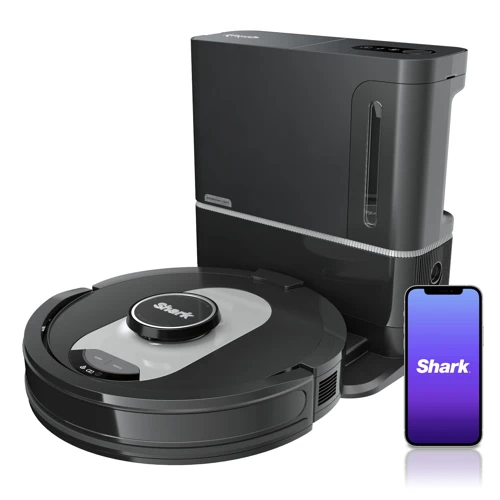
Maintaining a clean and allergen-free home is a constant battle for many. With the advancement in technology, smart vacuum cleaners with anti-allergen technology have become increasingly popular. These vacuums tackle allergens head-on, making them an excellent investment for those with allergies or asthma. In this section, we will delve into the benefits of smart vacuum cleaners with anti-allergen technology including better air quality, reduced allergens, and improved cleaning performance. So, let’s dive in and explore why these vacuums are worth considering! You can learn more about smart vacuums with anti-allergen technology on our website.
1. Better Air Quality
Smart vacuum cleaners with anti-allergen technology offer several benefits that can greatly improve the air quality in your home. Here are some ways these devices make a noticeable difference:
- HEPA Filters: Many smart vacuum cleaners have high-efficiency particulate air (HEPA) filters that capture tiny pollutants and allergens typically missed by conventional vacuums. These filters are designed to trap potentially harmful particles as small as 0.3 microns, such as pet dander or pollen.
- Air Sealing: By employing advanced air sealing technologies, smart vacuum cleaners prevent allergens and pollutants from escaping back into the air. As a result, you’ll see a significant reduction in the amount of dust, pollen or mold spores in your home.
- Connected Features: Modern smart vacuums often come with connected features that enable you to manage your device through an app or smart home assistant. With this technology, you can monitor the quality of air in your home and make sure to vacuum when needed for better allergen control.
When these innovations work in tandem, you’re left with cleaner air quality that offers numerous benefits. These types of vacuums help people with allergies, asthma, and respiratory problems, as well as prevent sickness and disease due to air pollution. They also do an excellent job of removing pet hair and other particulates that can trigger the immune response, ultimately leading to improve overall health.
According to the American Quality Air Association, Americans spend as much as 90% of their time indoors, meaning air quality inside our homes is essential. In recent studies, poor indoor air quality has been linked to headaches, fatigue, and even an increased risk of respiratory problems, such as asthma. By investing in a powerful smart vacuum cleaner that focusses on anti-allergen technology, you can breathe easier and promote better health for your entire household.
Keep reading our related article to learn how to maintain and extend the life of your anti-allergen technology features on your smart vacuum cleaners.
2. Reduced Allergens in Your Home
Smart vacuum cleaners with anti-allergen technology are designed to help reduce allergens in your home, making it a healthier environment for you and your family. Allergens are a common problem in many homes, particularly for those with allergies or respiratory conditions like asthma. These particles can trigger allergic reactions, such as sneezing, coughing, and even asthma attacks.
By using a smart vacuum cleaner with anti-allergen technology, you can effectively reduce the number of allergens in your home. This is because these vacuums are equipped with HEPA filters, which are designed to capture and trap microscopic particles such as pollen, pet dander, and dust mites. HEPA filters are much more effective at capturing these particles than standard filters, which can allow allergens to circulate back into the air.
To provide additional benefits to those with allergies or asthma, some smart vacuum cleaners also come with UV-C lights. These lights work to kill germs, bacteria, and viruses, which can also trigger allergic reactions.
In addition to the HEPA filters and UV-C lights, many smart vacuum cleaners with anti-allergen technology are also designed to be bagless. This means that you can easily empty the dustbin without coming into contact with the allergens that have been collected. This is particularly important for those with asthma, as exposure to allergens can trigger an asthma attack.
The reduced number of allergens in your home can lead to better health and well-being for you and your family. While there is an additional cost associated with smart vacuum cleaners with anti-allergen technology, the benefits may be worth it for those who suffer from allergies or asthma.
3. Improved Cleaning Performance
One of the key benefits of smart vacuum cleaners that have anti-allergen technology is that they offer improved cleaning performance. This is because they are equipped with features that help them to better clean floors, carpets, and furniture in your home. Let’s take a closer look at how this works.
One important feature of these vacuums is powerful suction. This allows them to pick up dirt and debris that may be deeply embedded in carpets or hard-to-reach corners of your home. Strong suction is especially important for those with allergies, as it can help to remove allergens such as pet dander, dust mites, and pollen from your floors and furniture. In fact, many smart vacuum cleaners on the market today are designed specifically to target these allergens, making them a great choice for allergy sufferers.
Another key feature that improves the cleaning performance of smart vacuums with anti-allergen technology is the use of HEPA filters. HEPA filters are specially designed to capture tiny particles that other vacuums may miss, such as allergens, bacteria, and viruses. In fact, HEPA filters are so effective that they are often used in hospitals and other healthcare facilities to clean the air. By using a vacuum with a HEPA filter, you can be confident that the air in your home is cleaner and healthier for you and your family.
Finally, many smart vacuum cleaners with anti-allergen technology come equipped with advanced sensor technology that can detect areas of your home that need extra attention. For example, if your vacuum detects a high concentration of pet hair or dust in a particular area, it will automatically increase suction power and cleaning performance in that area. This ensures that your floors and furniture are thoroughly cleaned, even in problem areas.
The improved cleaning performance of smart vacuum cleaners with anti-allergen technology is a big selling point for many consumers. By investing in one of these vacuums, you can be confident that your home is cleaner and less likely to trigger allergies and other respiratory issues. Plus, with features like powerful suction, HEPA filters, and advanced sensor technology, you can be sure that your floors and furniture are getting the thorough cleaning they need to stay fresh and healthy.
| Improved cleaning performance features: |
|---|
| Powerful suction: Vacuums with anti-allergen technology come equipped with strong suction that can pick up dirt and debris deep within carpets and hard-to-reach corners. |
| HEPA filters: These filters can capture tiny allergens, bacteria, and viruses, ensuring that the air in your home is cleaner and healthier. |
| Advanced sensor technology: Some smart vacuums can detect areas of your home that need extra attention, ensuring that your floors and furniture are getting the thorough cleaning they need. |
Drawbacks of Smart Vacuum Cleaners with Anti-Allergen Technology
While smart vacuum cleaners with anti-allergen technology offer many benefits to homeowners, there are also some drawbacks to consider before making a purchase. These vacuums can come with an additional cost and some models may have lower suction power. Additionally, replacement filters can be pricey. It’s important to weigh the pros and cons of these products to make an informed decision. Let’s take a closer look at these drawbacks in more detail.
1. Additional Cost
While there are many benefits to owning a smart vacuum cleaner with anti-allergen technology, it’s important to consider the possible drawbacks as well. One of the most significant drawbacks is the additional cost that comes with these advanced features.
Here are some points worth considering when it comes to the extra cost of smart vacuum cleaners with anti-allergen technology:
- Higher initial purchase price: When compared to standard vacuum cleaners, those with anti-allergen technology tend to come with a higher price tag. This is because they are equipped with additional features that are specifically designed to improve air quality and remove allergens from your home. If you’re on a tight budget, this extra cost may be a concern.
- Possible ongoing expenses: Some models have ongoing maintenance expenses to keep up the anti-allergen technology features. For example, replacement filters may need to be purchased on a regular basis to keep your smart vacuum running in top condition. This will add to the overall cost of owning and maintaining your device.
- Potential for repair costs: In the event that your smart vacuum cleaner needs to be repaired, having anti-allergen technology could make the cost of repairs more expensive. The additional features and components that these devices have may add to the overall cost of repairs, compared to a standard vacuum cleaner.
While the additional cost of smart vacuum cleaners with anti-allergen technology may be a concern for some consumers, it is important to weigh the benefits against the costs. Ultimately, if you or anyone in your household suffers from allergies or asthma, the increased air quality and reduced allergens may be worth the investment.
2. Some Models Have Lower Suction Power
When it comes to purchasing a smart vacuum cleaner with anti-allergen technology, one drawback to consider is that some models may have lower suction power than traditional vacuum cleaners. This can be a significant inconvenience for those who need a vacuum cleaner that can tackle tough dirt and debris.
Here are some specific issues to be aware of when it comes to suction power:
- Some smart vacuum cleaners rely on battery power, which can limit the suction power and runtime. It’s important to check the specifications of any model you’re considering to ensure that it has enough suction power to meet your needs.
- Additionally, some anti-allergen vacuums rely on filters that have to be replaced regularly. If these filters become clogged, it can reduce the suction power of the vacuum. This means that owners will need to be diligent about changing filters to ensure that the vacuum cleaner continues to operate at peak efficiency.
- Finally, some models may simply have lower suction power overall. This can be the result of a variety of factors, such as the design of the vacuum cleaner’s motor, the shape and size of the vacuum’s hose and brush head, and the type of flooring that the vacuum is designed to clean.
While lower suction power can be a downside of some smart vacuum cleaners with anti-allergen technology, it’s important to note that not all models will have this issue. If powerful suction is a priority for you, be sure to do your research and choose a model that’s known for its cleaning performance.
3. Replacement Filters Can Be Expensive
When considering the purchase of a smart vacuum cleaner with anti-allergen technology, it’s important to take into account the cost of replacement filters. These filters are crucial in maintaining the vacuum’s effectiveness in removing allergens from your home, but they can also be quite expensive.
Types of Replacement Filters
Different vacuum models require different types of replacement filters. Some common types of filters include HEPA (High-Efficiency Particulate Air) filters, foam filters, and pre-motor filters. HEPA filters are known for their ability to capture particles as small as 0.3 microns, while foam filters are used to catch larger debris like pet hair and dander. Pre-motor filters protect the vacuum motor from damage caused by dust and dirt.
Cost of Replacement Filters
The cost of replacement filters for smart vacuum cleaners with anti-allergen technology can vary greatly depending on the model and type of filter needed. On average, replacement filters can cost anywhere from $10 to $50 each. HEPA filters, for example, tend to be on the more expensive side, but they also offer the highest level of filtration. It’s important to keep in mind that these filters need to be replaced on a regular basis, typically every 6-12 months, which can add up over time.
Tips for Saving Money on Replacement Filters
While replacement filters can be expensive, there are some ways to save money without sacrificing the effectiveness of your vacuum cleaner. One option is to purchase generic brand replacement filters instead of brand name filters. These filters are often just as effective but cost less than their brand name counterparts. Another option is to purchase filters in bulk, which can offer significant savings.
Conclusion
While replacement filters for smart vacuum cleaners with anti-allergen technology can be expensive, they are necessary for maintaining the effectiveness of the vacuum’s filtration system. By taking the time to research and compare different filter options, and using cost-saving strategies like purchasing generic filters or buying in bulk, you can ensure that your vacuum continues to provide clean air for you and your family without breaking the bank.
Conclusion
After considering the benefits and drawbacks of smart vacuum cleaners with anti-allergen technology, it is clear that they can be a worthwhile investment for those with allergies or respiratory issues. The improved air quality and reduction of allergens in the home can greatly improve one’s quality of life. However, the additional cost and possibility of lower suction power and expensive replacement filters should also be taken into account.
Ultimately, the decision of whether or not to purchase a smart vacuum cleaner with anti-allergen technology will depend on individual circumstances and priorities. For those with severe allergies or asthma, the benefits may outweigh the costs. For those with milder allergies and a tighter budget, a traditional vacuum cleaner may suffice.
Regardless of the specific model chosen, it is important to regularly maintain and clean the vacuum cleaner to ensure optimal performance and effectiveness. Keeping up with filter replacements and cleaning brushes and attachments can also help prolong the life of the vacuum cleaner.
In conclusion, while smart vacuum cleaners with anti-allergen technology may not be necessary for everyone, they can provide significant benefits for those with respiratory issues and allergies. Careful consideration of the costs and benefits should be made before making a purchase, but ultimately, the investment may be worth it for those seeking improved air quality and decreased allergens in the home.
Frequently Asked Questions
1. How does anti-allergen technology work in smart vacuums?
Anti-allergen technology in smart vacuums typically involves using HEPA filters, which can capture small particles such as pollen and dust mites, to prevent these allergens from being released back into the air.
2. Can smart vacuums with anti-allergen technology completely eliminate allergens?
While smart vacuums with anti-allergen technology can greatly reduce the amount of allergens in your home, they may not completely eliminate them. Other measures, such as regularly washing bedding and vacuuming upholstery, may also be necessary.
3. Are smart vacuums with anti-allergen technology suitable for pet owners?
Yes, smart vacuums with anti-allergen technology can be beneficial for pet owners as they can capture pet dander and fur. However, it’s important to note that some models may be more effective than others for pet hair.
4. Do all smart vacuums with anti-allergen technology require replacement filters?
Most smart vacuums with anti-allergen technology require replacement filters to maintain their effectiveness. However, the frequency of filter replacements can vary depending on the model and how often the vacuum is used.
5. Are smart vacuums with anti-allergen technology louder than regular vacuums?
While the noise level of smart vacuums with anti-allergen technology can vary, they generally are not significantly louder than regular vacuums.
6. How much does a smart vacuum with anti-allergen technology cost compared to a regular vacuum?
Smart vacuums with anti-allergen technology can cost significantly more than regular vacuums. Prices can range from a few hundred dollars to over a thousand dollars depending on the model, brand, and features.
7. Are smart vacuums with anti-allergen technology difficult to set up and use?
This can vary depending on the model and brand, but many smart vacuums with anti-allergen technology are designed to be user-friendly and easy to set up and use.
8. Can smart vacuums with anti-allergen technology be controlled remotely?
Many smart vacuums with anti-allergen technology can be controlled remotely using a phone app or voice commands. This can be convenient for scheduling cleaning sessions and controlling the vacuum from a different room.
9. Are smart vacuums with anti-allergen technology more energy-efficient than regular vacuums?
Smart vacuums with anti-allergen technology may be more energy-efficient than regular vacuums, as some models are designed to be more eco-friendly and use less power.
10. Do all smart vacuums with anti-allergen technology have the same features?
No, smart vacuums with anti-allergen technology can vary greatly in terms of features and capabilities. Some may have more advanced navigation systems, while others may be more focused on filtration and allergen capture.
